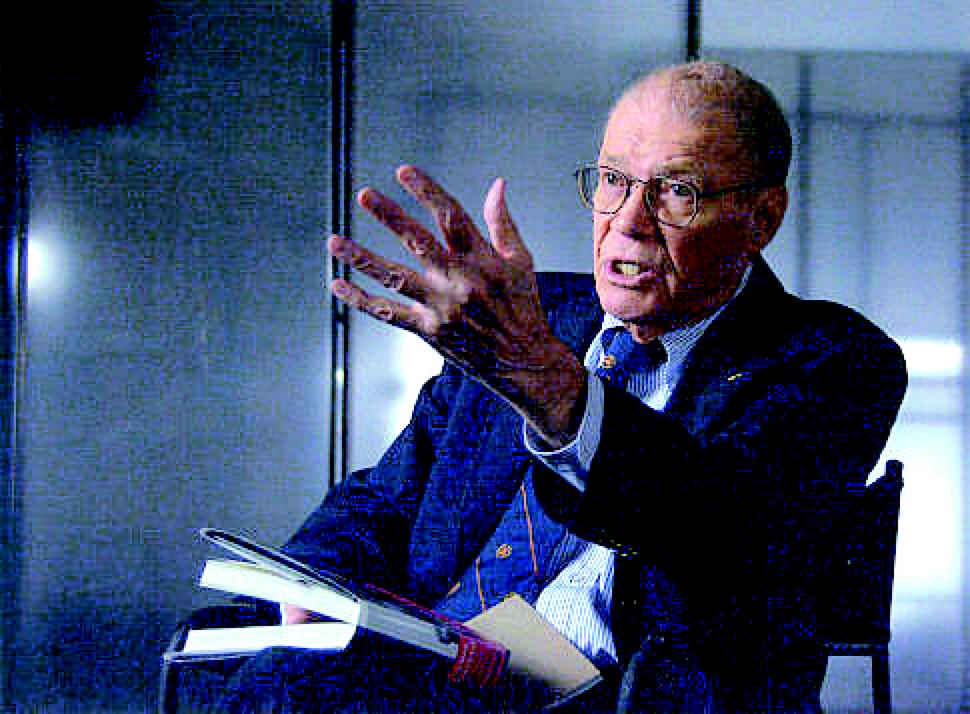Over the years, Morris has developed a fascination with people teetering on the knife-edge of morality. It's hard to tell if we're supposed to root for his subjects or be utterly repelled by them. From the obsessive pet owners in Gates of Heaven to the corrupt cops in The Thin Blue Line to the execution device inventor-turned-Holocaust denier in Mr. Death: The Rise and Fall of Fred A. Leuchter, Jr., Morris has trained his gaze on a host of sketchy characters. It is to the filmmaker's credit, however, that he refuses to vilify these people, instead letting them tell their own stories in their own words.
Using the Interrotron, a device he first experimented with in Fast, Cheap and Out of Control and used to great effect in Mr. Death, Morris takes us inside the mind of McNamara, the virtual architect behind the Vietnam War. The Interrotron is a simple machine that projects the interviewer's face over the lens of the camera. This allows the interviewee to speak directly to the camera with ease. This means, of course, that the subject of the film is speaking face-to-face with us, the audience. It makes the film incredibly intimate and a little uncomfortable.
With no voice-over, and only occasional off-screen questions from Morris, McNamara lays out his life story in blunt detail. We get info on his college days, his role in World War II, his brief stint as the president of Ford Motor Company. But it is his tenure as secretary of defense under John F. Kennedy and, later, Lyndon Johnson that has made McNamara's name a flashpoint for peace activists.
McNamara has been described by friends and enemies alike as “cold,” “calculating” and “computer-like.” Even at the age of 88, McNamara is an incredibly smart man. Years after the fact, he is able to recite numbers, percentages and statistics. He knows the percentage of citizens who died in the firebombing of Tokyo. He knows the number of B-29 pilots who chickened out of their missions over Germany. He can recall precisely the number of nuclear weapons in Cuba during the Cuban Missile Crisis.
Hearing McNamara reduce the bulk of 20th-century conflict to a pile of raw data is, on the one hand, scary. On the other hand, McNamara has never forgotten these sobering statistics. It's probably safe to say that all those generals who espoused a “shoot first, ask questions later” policy in both World War II and Vietnam never gave those numbers a second thought. As a result, it's possible to walk out of The Fog of War with two very different portraits of Robert McNamara. He could be seen as a Machiavellian number-cruncher who helped enforce the political, economic and military status quo for decades. He could just as easily be seen as the sole, intellectual voice of reason in a room full of gun-toting cowboys.
Still commanding, obdurate and unapologetic, McNamara readily admits that, had the Allies not been victorious, he would have been tried as a war criminal for his role in the Tokyo firebombings. At the same time, McNamara comes across as cautious, almost anti-war in some stunning archival footage (from recently declassified Defense Department footage to actual telephone conversations between McNamara and his presidential bosses). Bottom line: There's nothing simple about Robert McNamara, because there's nothing simple about the issues he represents.
The most frightening lesson learned from The Fog of War may be that war is run by human beings and human beings are, as McNamara readily points out, scared, misguided, misinformed and often hugely fallible. It's almost comforting to think of our leaders (here and abroad) as “good” or “evil.” Those are positions of confidence. It's far scarier to think of them being just as conflicted and confused as the rest of us.
Though Morris' interviews were filmed a year or so before the current war in Iraq, the message couldn't be more pressing. The mistakes of the past that McNamara seems haunted by are being re-enacted to this very day. Whether we agree or disagree with
this controversial figure, we would do well to listen to what he has seen, heard and experienced.



